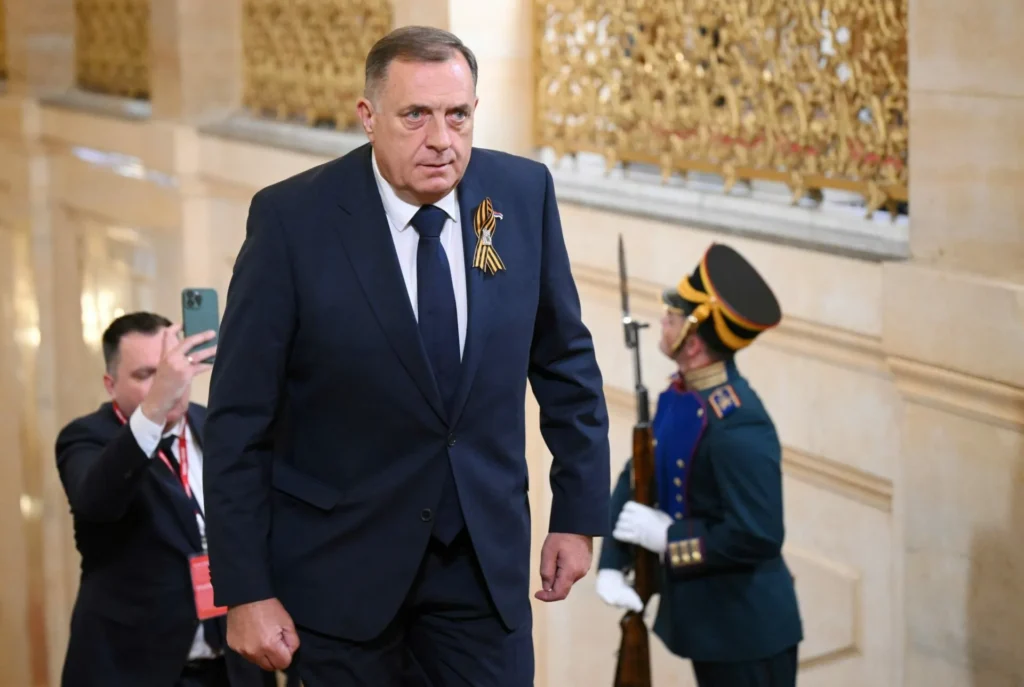Amid suggestions that Slovenia would soon decide on sanctions against Republika Srpska – keep in mind that sources claimed that Ljubljana Mayor Zoran Janković, through Foreign Minister Tanja Fajon, was blocking the sanctions – Republika Srpska President Milorad Dodik started threatening Slovenia, saying that they would find a way to respond to the sanctions if they were to be imposed. So, between the lines, he announced counter-sanctions. But in what ways could the Republika Srpska harm Slovenia?
“Slovenians must know that we in Republika Srpska will retaliate, whatever that means,” Dodik said in an interview with Republika Srpska media outlets, during a recent visit to Moscow, where he attended a military parade on Friday, the 9th of May, to mark the 80th anniversary of the end of the Second World War.
Threats to politicians and businessmen
He was responding to media reports that at least four members of the European Union, including Slovenia, are considering sanctions against Republika Srpska representatives – the other EU members are believed to be Estonia, Poland and the Czech Republic. The sanctions would concern Dodik, Prime Minister Radovan Višković, and the Speaker of the Republika Srpska National Assembly, Nenad Stevandić.
As a retaliation measure, Dodik mentioned that Slovenian ministers could be banned from using Republika Srpska as a transit route, and he went even further – between the lines – and threatened Slovenian businessmen, saying that Republika Srpska remains favourable to Slovenian businessmen, but that they must know that politics is doing them a disservice with such decisions. He said that there were many Slovenian businessmen working in Republika Srpska and that they were valued and would be supported.
Dodik also wondered why Slovenia would even impose sanctions, saying that Republika Srpska was not destroying Bosnia and Herzegovina, but only demanding that its constitutional position be respected, Tanjug reports.
What can Dodik blackmail us with?
“What a meaningless bluff. Slovenia can easily respond by freezing the financial and other assets under the Slovenian jurisdiction of the gentlemen from Republika Srpska. There is quite a bit of that in Slovenia,” wrote the former MEP of the List of Marjan Šarec (Lista Marjana Šarca – LMŠ), Klemen Grošelj, on the social network X.

This is true – Republika Srpska certainly benefits more from Slovenia than Slovenia does from the Republika Srpska, because, for Dodik, Slovenia is a window to the world through the Serbian diaspora in Ljubljana, which is unofficially commanded by the Mayor of Ljubljana, Zoran Janković. But this is also one of the reasons why Dodik has leverage that is not entirely obvious in the country’s official politics. As we have already written, according to the Bosnian media, Slovenia has become a haven for the dubious capital of Dodik and his tycoons. We have already reported that Mladen Milanović Kaja, a businessman linked to Dodik, through his company MG Mind, bought the unfinished business part of the large Stožice sports and business complex in Ljubljana from Izet Rastoder.
Sources say that Dodik has a strong influence on Slovenian politics, saying that Slovenia has so far not imposed sanctions against Dodik because the Ljubljana Mayor Zoran Janković allegedly lobbied directly against sanctions to avoid a deterioration of relations with Serbian President Aleksandar Vučić. Foreign Minister Tanja Fajon is said to have obliged him, but according to the web portal, although some members of the Slovenian government support the sanctions, the lack of consensus within the coalition has prevented them from being implemented at this time.
Janković’s influence
In the context of the specific Slovenian political reality, it is important to understand the dynamics between Zoran Janković, who makes no secret of his friendly links with Dodik, and the rest of the Slovenian left. Janković has positioned himself as the “Kučan after Kučan,” and also perceives Prime Minister Robert Golob as his subordinate, which was most clear in the early days of the latter’s Freedom Movement party (Gibanje Svoboda), when Janković attended party congresses as if he were running the party and Golob was his assistant. It is also important to note that after Janković’s fiasco in 2012, all the left-wing presidents (with the exception of Miro Cerar) were his direct subordinates, and he was their party boss – Alenka Bratušek, Marjan Šarec and Robert Golob.
Those in the know know that our Western allies have been pressing our government to adopt sanctions against Republika Srpska for some time, especially in the context of Slovenia’s non-permanent membership of the UN Security Council, but this move has so far been delayed. Dodik does not really have a serious chance of influencing the Slovenian economy, but he certainly has the chance to influence that part of the economy which is intimately connected with Slovenian left-wing politics and, through it, with dubious links to Republika Srpska.
Dodik was convicted last year
At the end of February, a court in Bosnia and Herzegovina sentenced Dodik to one year in prison and a six-year ban on political activity for disrespecting the decisions of the High Representative of the international community in Bosnia and Herzegovina, the German politician Christian Schmidt. The verdict is not yet final, and an arrest warrant has been issued for Dodik. Only Germany and Austria have banned Dodik from entering the country for his secessionist rhetoric, while the Netherlands is considering similar sanctions, but Croatia has rejected this option.
Fajon and Janković deny that they influenced Slovenia’s reluctance to impose sanctions against Dodik, but a journalist from the Bosnian web portal Istraga urged them to impose sanctions and prove him wrong: “The best thing would be to impose sanctions and prove that he is lying. Until then, Istraga’s claims are true because there are no sanctions against him. And what are all these possibilities and saying that they will follow the developments about? This means that at the moment, what has happened so far, is not enough.”
To date, no sanctions have been imposed against Dodik.
I. K


